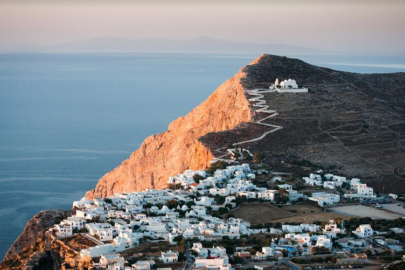Small, a mere 13 km in length and 31 square km in area, at first arrival Folegandros doesn’t seem to offer much – the port village of Karavostasis is a scattered jumble of low key buildings, and further out there are no significant archaeological sites, few cultural diversions, low key nightlife, no airport, just two ATMs and only one main road.
What it does offer though are the simple authentic pleasures of Greek island life; a picture perfect dazzling white Chora is built around the walls of a Venetian fortress high on steep cliffs that plunge into sparkling seas, there are an array of good beaches and coastal swimming areas, there is a proud local food tradition, and the landscape is wild and unsullied by mass development. An island for dedicated Cycladic lovers, rugged Folegandros is the undiluted magic essence of an Aegean island.
The name Folegandros may come from the son of King Minos, Pholegander, who used the island as a place of exile for those banished from Crete, and it was again used so by the Romans and in the 20th century too because of its isolation; the island only received electricity in 1974. Today, Folegandros is more welcoming, catering to a well-heeled crowd who often come every year, seduced by idle days on the beach, long lunches and nightly promenades in the pretty streets of Chora.
Discreet and inconspicuous, Folegandros may not shout its charms as loud as its noisy neighbours and while the sunsets on Santorini may be legendary Folegandros is only 30 nautical miles away, built upon equally impressive cliffs and you won’t have to share the experience with a thousand fellow holidaymakers.
Ask me anything
Explore related questions





